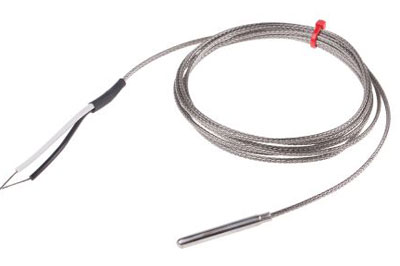WE RECOGNIZE AS A TRUSTED MANUFACTURER, SUPPLIER, AND EXPORTER OF RTD SENSOR, PT100 SENSOR, THERMOCOUPLE TYPE T, J, AND K.
WE KEEP HUGE STOCK OF RESISTANCE TEMPERATURE DETECTOR, J K T TYPE THERMOCOUPLE, PT100 SENSOR TO SATISFY ANY SMALL AND LARGE QUANTITY ORDERS FROM OUR VALUABLE CUSTOMERS AT MARKET LEADING PRICES.
Resistance thermometers, also called resistance temperature detectors (RTDs), are sensors used to measure temperature. Many RTD elements consist of a length of fine wire wrapped around a ceramic or glass core but other constructions are also used. The RTD wire is a pure material, typically platinum, nickel, or copper. The material has an accurate resistance/temperature relationship which is used to provide an indication of temperature. As RTD elements are fragile, they are often housed in protective probes.
RTDs, which have higher accuracy and repeatability, are slowly replacing thermocouples in industrial applications below 600 °C.
for more details Visit Here.
PT-100 SENSOR

PT-100 SENSOR
Darshil Trading manufactures Pt-100 sensor confirming to all international standards. Accuracy in measurement of Temperature, faster response, sturdiness, ease in maintenance and replacement are the main criteria of design.
PT-100 Sensor Specifications:
Standard dimension: – O.D 15.8mm x 95mm.
Non standard size can be manufactured on request.
RTD SENSORS
RTD SENSORS
Resistance Temperature Detectors (RTD’s) are temperature sensing devices consisting of a wire coil or deposited film of pure metal, usually platinum. The element’s resistance increases with temperature in a known and repeatable manner. RTD’s exhibit excellent accuracy over a wide temperature range.
Non standard size can be manufactured on request.
THERMOCOUPLE SENSOR

THERMOCOUPLE SENSOR
Thermocouple consists of two wires of dissimilar metals welded together into a junction. At the other end of the signal wires, usually as part of the input instrument, is another junction called the reference junction. Heating the sensing junction generates a thermoelectric potential (emf) proportional to the temperature difference between the two junctions. This millivolt-level emf, when compensated for the known temperature of the reference junction, indicates the temperature at the sensing tip. Non standard size can be manufactured on request. (The picture shown is a thermocouple used in blister packaging machine,still a non standard size can be manufactured on request.).
THERMOCOUPLE TYPE J
The type J Thermocouple is also very common. It has a smaller temperature range and a shorter lifespan at higher temperatures than the Type K. It is equivalent to the Type K in terms of expense and reliability.
Type J Temperature Range:
- Thermocouple grade wire, -346 to 1,400F (-210 to 760C)
- Extension wire, 32 to 392F (0 to 200C)
THERMOCOUPLE TYPE K
The type K is the most common type of thermocouple. It’s inexpensive, accurate, reliable, and has a wide temperature range. The type K is commonly found in nuclear applications because of its relative radiation hardness. Maximum continuous temperature is around 1,100C.
Type K Temperature Range:
- Thermocouple grade wire, –454 to 2,300F (–270 to 1260C)
- Extension wire, 32 to 392F (0 to 200C)
THERMOCOUPLE TYPE T
The Type T is a very stable thermocouple and is often used in extremely low temperature applications such as cryogenics or ultra low freezers. It is found in other laboratory environments as well. The type T has excellent repeatability between –380F to 392F (–200C to 200C).
Type T Temperature Range:
- Thermocouple grade wire, -454 to 700F (-270 to 370C)
- Extension wire, 32 to 392F (0 to 200C)








There are no reviews yet.